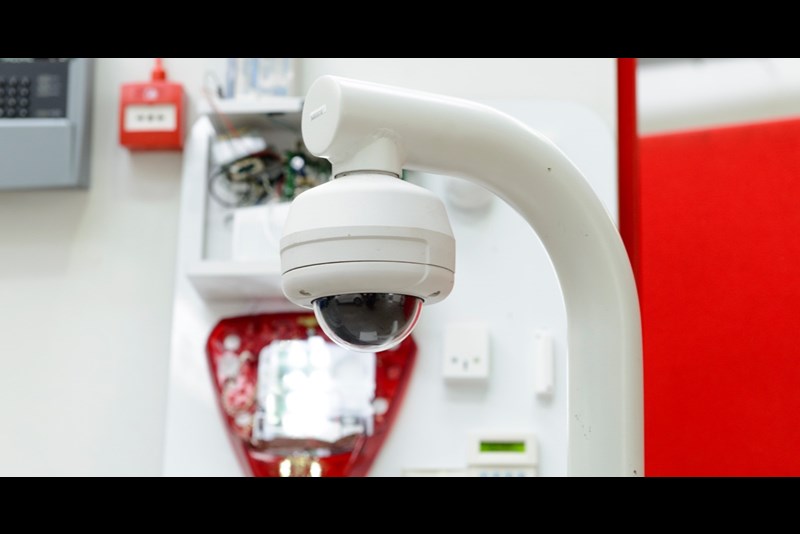Do you like the sound of an apprenticeship in electronic fire and security alarm systems? GTG Training Instructor and Assessor Ross Weston tells you all you need to know about the course – and about his own journey from apprentice to trainer.
What is the Electronic Fire and Security Systems course?
‘It’s a three-year apprenticeship, which will award the apprentices an SVQ 6 qualification through the SQA on completion.
‘While it’s not a course you’d normally think of studying through GTG, going a bit under-the-radar in one of the most successful automotive centres in Britain, I teach the course from an electrical engineering standpoint. We study aspects like electrical principles, cabling and voltages. We use a lot of physics and problem solving throughout the course.’
What experience do you have in this field?
‘I left school to begin studying this course. After completing my apprenticeship, I became an engineer at a different company, and then progressed into my role as trainer here at GTG, starting in February 2020.
‘I teach the same fundamental course material today that I learned as an apprentice, while making sure that the course material keeps up with advancements in technology – it’s a fast-moving industry.
‘It’s a course with the potential for progression, such as becoming an alarm engineer, working as a sales engineer, or in a supervisor role in the alarm industry. But even if you don’t want to work in the alarm industry, you can go into electrical engineering, or even look into teaching the skills you’ve learned as a trainer.
‘And if you decide to go down the trainer route after completing your apprenticeship and working, you’ll be using the experiences you’ve gained and sharing them with others.
Why study this course at GTG?
‘First of all, it’s a trade in its own right, allowing you to work in the alarm industry, a real growing sphere where there’s a lot of demand for these skills, but it’s also an excellent foundation that can act as a springboard to other career avenues. We’re one of only four venues in Scotland to teach this course, and our two centres mean there is a lot more flexibility around choosing a venue to study, based on where you are in Scotland.
‘The facilities at both GTG Glasgow and GTG Edinburgh are excellent, as is the standard of training a learner will receive.
‘As a candidate you’ll learn so much, but classes also welcome idea-sharing and conversation. It’s said that “as you teach, you learn”, and as a trainer I’ve found it’s important to create that environment where students can ask questions - and question the things I say as a trainer – because you can learn a lot from listening to your students.’
How has the course grown since it was introduced?
‘It’s maybe an under-the-radar course because GTG is synonymous with course areas such as automotive, business skills, or health and safety, but outreach into schools has really helped raise the interest in the course. For this year’s intake we have nine candidates on the course already.
‘Later in 2021, we would like to invite interested fifth and sixth-year students who would soon be leaving school, to spend one day a week at GTG, working towards an electronics qualification. It can inspire a lot of interest in young people to go into this line of work.’
How has the course been adapted to help apprentices learn at home?
‘Businesses were caught off-guard when the pandemic hit in early 2020, and GTG was no different – we had to adapt our working practices.
‘There are two parts to the Electrical, Fire and Security Systems course. The first is PDA, which is more theory-based, through PowerPoints, face-to-face demonstrations and hands-on practice. This is the learners’ essential material. The second, the SVQ side of the apprenticeship, is writing up their experiences in a logbook at different points in their learning journey, normally every couple of months.
‘For SVQ we use a digital platform where learners upload their progress. For adapting to remote learning, this ready-made resource has allowed us to carry on. All our instructors are trained in delivering online learning and presentations – thanks to in-house training delivered by GTG – so it shows that GTG is moving with the times and is prepared for working in this way, however long restrictions dictate that we have to.
It means learners don’t need to put their qualifications on hold, as they’ve got targets to meet each year. But remote learning can be beneficial for students, too, because they’re comfortable in their home environment, and can become more confident about expressing their own learning and ideas.’
Does ‘alarm engineer’ have a nice ring to it? Or has it sparked an interest in all things electrical? Visit our Electronic Fire and Security System Apprenticeship section to find out more.
